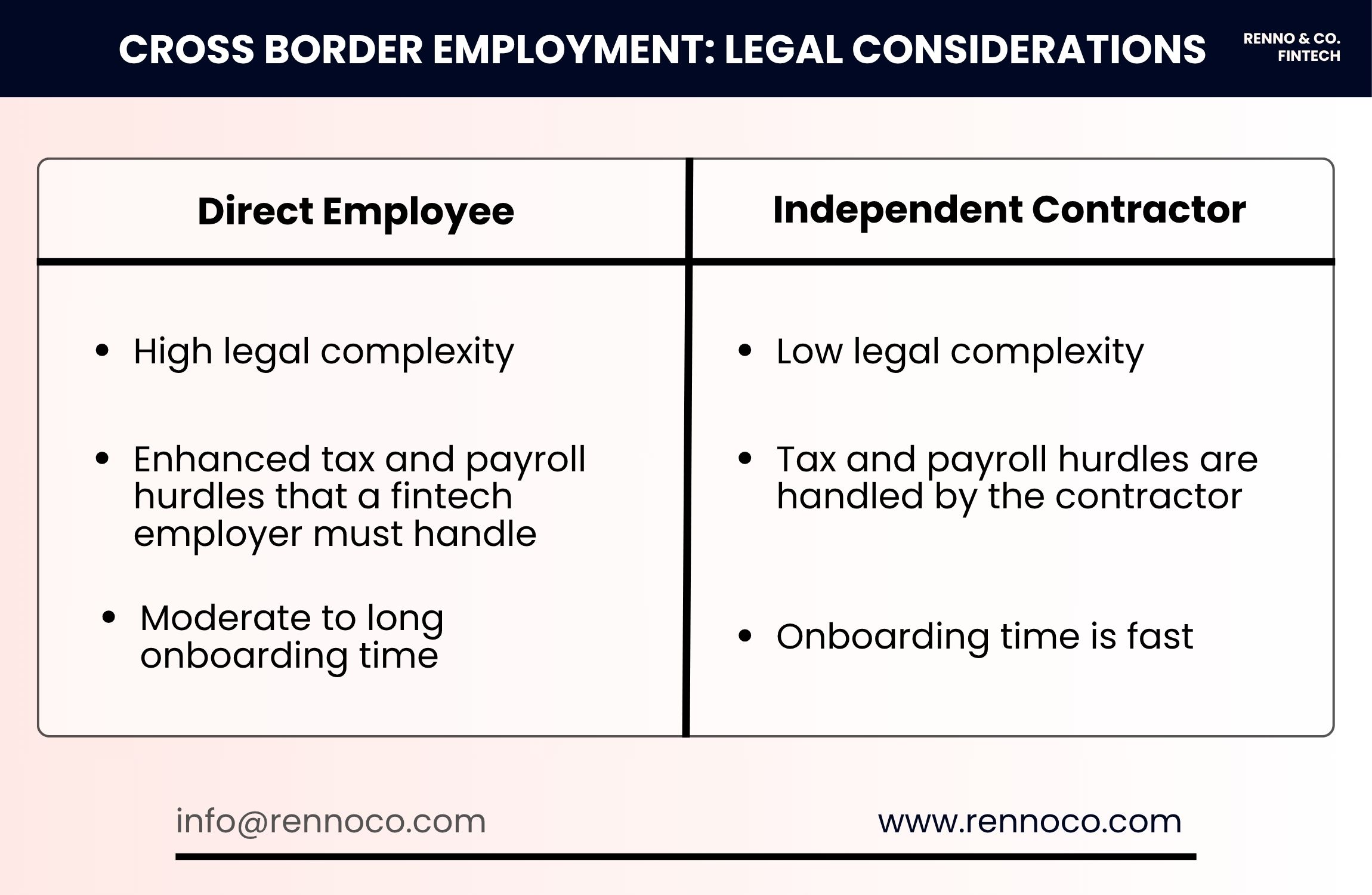Remote working is becoming the new norm for many employees and Canadian companies. You may want to hire international workers to leverage great talent and cross border employment opportunities for your fintech.
The only problem is that you may not know how to navigate the legal challenges of cross border employment. We can help you tackle such issues with our legal advice. Let’s dive into the world of legal considerations for cross border employment for Canadian MSBs.
Can a Canadian MSB use Cross Border Employment for Hiring?
A Canadian fintech, such as cheque cashers or crypto asset providers, can hire workers outside the country. You can use cross border employment tactics to develop a workforce that doesn’t reside in Canada.
These workers will help your money service business develop compliance programs, maintain client transactions, and more. The best thing is you can hire experienced talent without worrying they’re not in Canada.
As a money service business (MSB), you can either hire a full-time foreign employee or an independent contractor. Both will help you streamline your company operations and grow it.
How to Use Cross Border Employment for Hiring International Workers?
Your fintech can hire international workers under cross border employment in two ways. The two routes are very different in terms of legal exposure, tax obligations, and operational complexity. Let's break them down:
Option 1: Hiring a Foreign Individual as an Employee
A Canadian fintech can hire foreign workers as formal employees under cross border employment methods. This will trigger various legal obligations in the worker’s country of residence. You’ll have to:
- Register as an employer in the employee’s country
- Withhold and remit income taxes in that country
- Pay into social security or statutory benefits required under local law
These requirements are not optional, you must comply with them no matter what. Failure to meet these legal obligations can lead to fines, legal liability, and more.
The biggest disadvantage is that hiring formal international employees will add to your startup costs. You’ll have to hire local legal and tax advisors to help you understand international laws.
Registering for various licenses in a foreign country will also enhance business setup costs.
Option 2: Hiring a Foreign Individual as a Contractor
Hiring individuals residing outside of Canada as independent contractors is easier for Canadian companies. These contractors are responsible for their own:
- Taxes
- Benefits
- Compliance with local regulations
All these self-responsibilities reduce your fintech’s administrative and legal obligations. You won’t have to comply with local tax withholding obligations or register in the employee’s country of residence.
Hiring a contractor is also the go-to cross border employment method for startups and early fintech companies.
How to Avoid Legal Challenges When Hiring a Formal Employee?
Despite the legal challenges, if you still want to hire a formal employee over a contractor, you must invest in an Employer of Record (EOR).
An EOR allows you to hire a third party who can act as the legal employer on your behalf in the worker’s country of residence. They perform tasks such as:
- Managing employment contracts, onboarding, payroll, and taxes
- Ensuring compliance with labour law, termination rules, and benefits
- Transferring the employee’s work product and loyalty contractually to your company
You can focus on your core operations without establishing a local entity with an EOR such as Remote.com, Deel, or Papaya Global.
How to Hire an Independent Contractor Correctly For Cross Border Employment?
Hiring foreign contractors safely and legally is essential to avoid complications. You must draft a clear contract that outlines:
- Working terms of the foreign contractor
- Payment conditions such as payment tools, salary amount, and frequency of payments
- Responsibilities of the contractor within your Canadian fintech
The best way to draft this contract is by collaborating with a fintech law firm such as Renno Co. & Fintech. We help prepare a solid contract that includes the worker's duties and deliverables.
How Does Renno Co. & Fintech Help you Hire Foreign Contractors?
Whether you’re hiring one freelancer in the Philippines or building a dev team across five continents, we can help you:
- Structure your international hiring legally
- Draft compliant independent contractor agreements
- Coordinate with EORs or US counsel if needed
- Reduce tax and employment risk while scaling fast
Our legal advisors also help you choose the right payment tool to transfer salaries to the foreign contractor. You can count on us to offer you the best fintech hiring experience for cross border employment
Plan your Cross Border Employment the Right Way: Book With us Now
Canadian companies have a lot of flexibility when it comes to hiring foreign workers, but that flexibility comes with the responsibility to get the legal structure right. Whether you use an EOR or independent contractor model, you must ensure compliance with local laws and draft airtight agreements that protect your business.
Contact us today to discuss your cross-border hiring plans and get the legal support you need to scale internationally with confidence.





